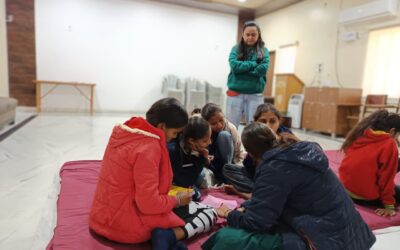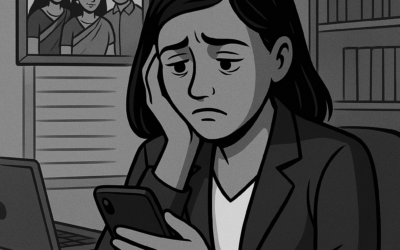A documentary called ‘Shit’ exposed me to a harsh and disturbing reality. Watching an elderly woman spread ash over a street full of human faeces, made my stomach turn. I felt sick!
But I could at least turn off the video … what about her?
She can’t turn off her life. For a Dalit sanitation worker, this job wasn’t just a moment of discomfort, but rather it was her everyday’s reality. As much as I wanted to look away, I couldn’t ignore the truth. Her story showed the ugly reality of caste system in India. A Dalit woman, in her late 50s preparing to clean the shit, In a low-income locality of Madurai. All the residents from children to elders defecate openly on the road. But who cleans up after them? And why?
In the video, the road was filled with shit. At first, I thought it was just animal dung. But a few minutes of closer observations helped me realise, “The street was covered in human waste”. The woman in the video spread ash to reduce the strong smell. She then swept and collected the waste, and carried it on her head for disposal.
The Life Of A Dalit Sanitation Worker
The old woman was pleading with the authorities to stop this. She had requested them multiple times to change and give her different duties. But authorities said, “As long as there’s shit here, you won’t be shifted”. When she asked villagers not to defecate on the street, she did not receive support. Instead she was told, “You are getting paid to do this job! So shut up and do your job.”
But her struggles don’t end here. I cannot imagine how and why?
For the most disgusting job in the world, this woman was getting paid only 3,000 Rupees per month. She also has a debt of 10,000rs with a monthly 10% interest i.e. 120% annual. Compare this with the education or housing loan interest rates of 10-12% annually that we have access to.
Sharing about her life she said, “Even after finishing her work, when she goes back home, no matter how much she cleans and washes herself she still stinks and that smell of the shit is always there”. She doesn’t receive any support from her supervisors like hand gloves or other cleaning equipment or not even a vessel for collecting and carrying that human waste to the disposal site.
I was disgusted by just watching her cleaning human waste, it was so unbearable to even continue watching that video. So many questions then started flooding into my head. Why she had to do this? Why couldn’t anyone else do it, like by using electronic instruments, tools or something? And why were these villagers not using already build toilets in the locality? Unfortunately my simple questions don’t have that simple answers!
Shattering My Views On Caste
A documentary named ‘India Untouched’ followed next. India Untouched exposes the brutal reality of caste based discrimination in India. They’ve shown how in different parts of India lower caste or mainly Dalit communities are treated inhumanely. Practices like untouchability in schools, hospitals, universities and even corporate and government offices is still very common.
As a general category student preparing for MBA entrance exams a few months ago, like my peers, I also used to think that caste reservations in India for the underprivileged are so useless and unfair.
“Why do they even need it? What’s the point when most of them are not so underprivileged anymore?”
From what I had seen around me, one of my strong beliefs was that caste based discrimination, untouchability and other such practices are things of the past in India. My worldview was that all lower castes communities have been taking advantage of reservations for several years now and they have secured a respectable social status in the society today. Like many others I thought, if the objective is to create equal opportunities for everyone then, why can’t reservations be offered based on financial background.
At that time, I was really proud of my supposedly revolutionary ideas for social change. Little did I know that everything I believed was just a conveniently distorted outlook.
Face To Face With The Inconvenient Truth
However, these beliefs were challenged and were then dismantled as I started gaining a deeper understanding of our society and social structures. Along with the interactions with the diverse and culturally rich group of young people with their own journeys and experiences, whom I met in the induction training of India fellow, which helped me see things from a perspective I had never seen before.
In India, the lower castes are believed to be so impure that even their presence is considered polluting by the upper castes. The impure status comes from the hereditary occupations like working with disposing of dead animals, sanitation work and leather. Therefore, these occupations are considered impure in Hindu society. And from there started the untouchability practices. But today, forced by circumstances of poverty and lack of respect and recognition in society, Dalits in India still continue to work as garbage collectors, cleaners of drains and sewers, sweepers of road and sanitation workers who end up collecting human shit.
While reflecting on this I realised, that the sweepers of the road who would clean the streets near my home back in metropolitan city like Mumbai are also Dalits, garbage collectors who’ve been coming to our house for years now are also from lower caste but I was never able to see this things which were just in front of me.

Unveiling The Distorted Lens Of Caste
For one section of society, caste systems don’t exist at all and for the other half that same system keeps them away from basic human rights and respect in the society. The early section, which includes all the elites and privileged, are wearing these lenses of ignorance which makes them see things from only one distorted perspective. And so they don’t see the things actually happening around them.
Shattering the preconceived beliefs can be hard. But we have to take up this challenge. Removing my lenses, changing my perspectives completely changed my understanding of society. All of these caste beliefs and practices I now see, have always been in front of my eyes. Blinded by my unawareness and self interest, I was incapable of noticing other people and their problems. But breaking those lenses has given me a much clearer view and understanding of society
But after understanding all of this, one question still lingers in my mind: Sanitation work is one of society’s most essential services. So, why is such crucial work treated as undignified and left for those at the margins?




0 Comments